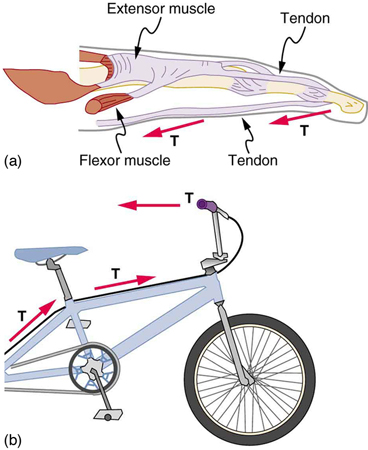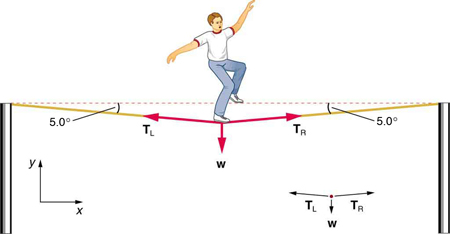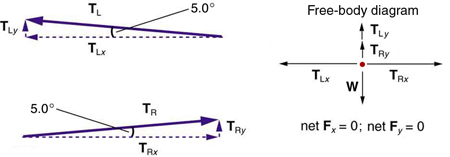| << Chapter < Page | Chapter >> Page > |

Calculate the tension in the wire supporting the 70.0-kg tightrope walker shown in [link] .

Strategy
As you can see in the figure, the wire is not perfectly horizontal (it cannot be!), but is bent under the person’s weight. Thus, the tension on either side of the person has an upward component that can support his weight. As usual, forces are vectors represented pictorially by arrows having the same directions as the forces and lengths proportional to their magnitudes. The system is the tightrope walker, and the only external forces acting on him are his weight and the two tensions (left tension) and (right tension), as illustrated. It is reasonable to neglect the weight of the wire itself. The net external force is zero since the system is stationary. A little trigonometry can now be used to find the tensions. One conclusion is possible at the outset—we can see from part (b) of the figure that the magnitudes of the tensions and must be equal. This is because there is no horizontal acceleration in the rope, and the only forces acting to the left and right are and . Thus, the magnitude of those forces must be equal so that they cancel each other out.
Whenever we have two-dimensional vector problems in which no two vectors are parallel, the easiest method of solution is to pick a convenient coordinate system and project the vectors onto its axes. In this case the best coordinate system has one axis horizontal and the other vertical. We call the horizontal the -axis and the vertical the -axis.
Solution
First, we need to resolve the tension vectors into their horizontal and vertical components. It helps to draw a new free-body diagram showing all of the horizontal and vertical components of each force acting on the system.

Consider the horizontal components of the forces (denoted with a subscript ):
The net external horizontal force , since the person is stationary. Thus,
Now, observe [link] . You can use trigonometry to determine the magnitude of and . Notice that:
Equating and :
Thus,
as predicted. Now, considering the vertical components (denoted by a subscript ), we can solve for . Again, since the person is stationary, Newton’s second law implies that net . Thus, as illustrated in the free-body diagram in [link] ,

Notification Switch
Would you like to follow the 'College physics for ap® courses' conversation and receive update notifications?